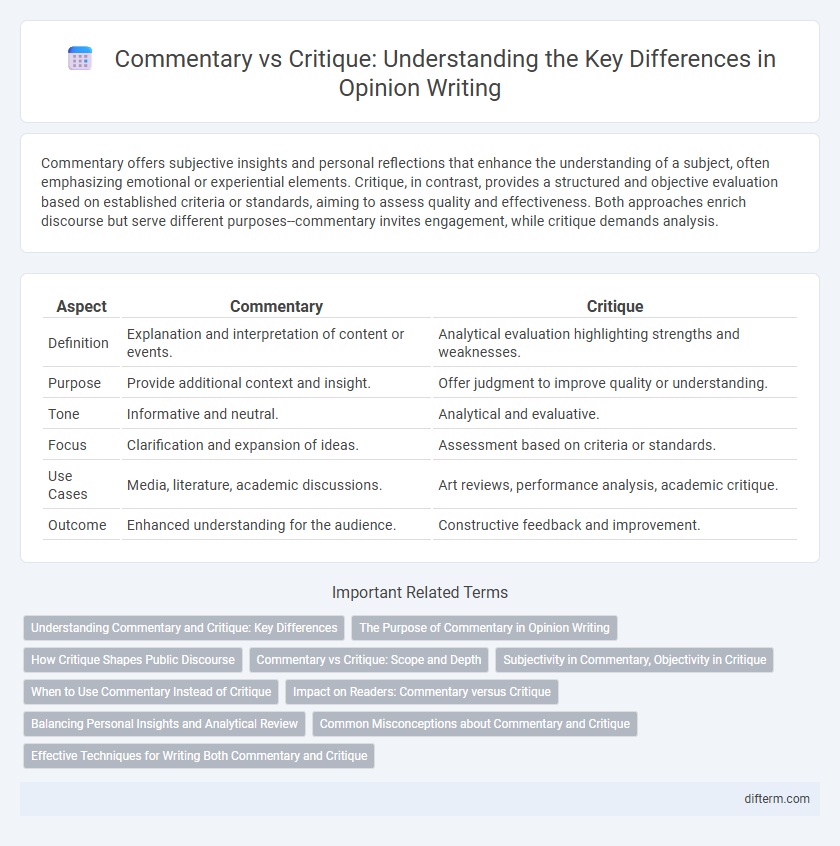Commentary offers subjective insights and personal reflections that enhance the understanding of a subject, often emphasizing emotional or experiential elements. Critique, in contrast, provides a structured and objective evaluation based on established criteria or standards, aiming to assess quality and effectiveness. Both approaches enrich discourse but serve different purposes--commentary invites engagement, while critique demands analysis.
Table of Comparison
| Aspect | Commentary | Critique |
|---|---|---|
| Definition | Explanation and interpretation of content or events. | Analytical evaluation highlighting strengths and weaknesses. |
| Purpose | Provide additional context and insight. | Offer judgment to improve quality or understanding. |
| Tone | Informative and neutral. | Analytical and evaluative. |
| Focus | Clarification and expansion of ideas. | Assessment based on criteria or standards. |
| Use Cases | Media, literature, academic discussions. | Art reviews, performance analysis, academic critique. |
| Outcome | Enhanced understanding for the audience. | Constructive feedback and improvement. |
Understanding Commentary and Critique: Key Differences
Commentary provides subjective insights and personal interpretations, often reflecting the commentator's viewpoints and emotional responses, while critique offers an objective, systematic evaluation based on established criteria or standards. Commentary tends to be more descriptive and opinion-driven, emphasizing the commentator's engagement with the subject, whereas critique analyzes strengths, weaknesses, and overall quality through critical reasoning. Understanding these differences enhances the clarity and purpose of communication in discussions of art, literature, media, or performance.
The Purpose of Commentary in Opinion Writing
Commentary in opinion writing aims to provide insight and personal interpretation that deepens the reader's understanding of a topic. Unlike critique, which evaluates strengths and weaknesses, commentary explores implications and connections that enrich the discussion. This approach encourages engagement by presenting perspective-driven analysis rather than judgment.
How Critique Shapes Public Discourse
Critique sharpens public discourse by providing in-depth analysis that challenges prevailing ideas and encourages critical thinking. It moves beyond surface-level commentary by systematically evaluating arguments, evidence, and implications, fostering a more informed and reflective public dialogue. This rigorous approach not only refines cultural and intellectual standards but also promotes accountability and progress within society.
Commentary vs Critique: Scope and Depth
Commentary offers a broad overview, emphasizing personal interpretation and contextual insights, while critique dives deeper with detailed analysis and evaluation based on established criteria. The scope of commentary is generally wider, touching on various aspects without exhaustive scrutiny, whereas critique focuses on the depth of understanding and judgment. This distinction highlights the complementary roles both play in enriching discourse and fostering a nuanced appreciation of the subject matter.
Subjectivity in Commentary, Objectivity in Critique
Commentary emphasizes subjectivity, offering personal insights and emotional responses that reflect individual perspectives and experiences. In contrast, critique relies on objectivity, systematically evaluating works based on established criteria, standards, and factual analysis. This distinction highlights the complementary roles both play in fostering deeper understanding and appreciation in various fields.
When to Use Commentary Instead of Critique
Commentary is appropriate when the goal is to provide insight or explain ideas without passing formal judgment, especially in educational or analytical contexts. It allows exploration of underlying themes and personal reflections without the rigor of evaluative assessment found in critiques. Use commentary to clarify, support, or expand on content, reserving critique for detailed evaluations of effectiveness, quality, or value.
Impact on Readers: Commentary versus Critique
Commentary often aims to engage readers through personal insights and relatable perspectives, fostering connection and reflection. Critique provides a detailed analysis that challenges readers to reconsider assumptions and deepen understanding. Both forms impact readers differently, with commentary evoking emotional resonance and critique stimulating intellectual rigor.
Balancing Personal Insights and Analytical Review
A balanced commentary effectively blends personal insights with analytical review, providing subjective perspectives enriched by objective evaluation. Incorporating evidence-based analysis alongside individual interpretation enhances the credibility and depth of the discussion. Striking this equilibrium ensures engaging content that resonates emotionally while maintaining intellectual rigor.
Common Misconceptions about Commentary and Critique
Common misconceptions about commentary and critique often confuse commentary as merely opinionated remarks, overlooking its role in providing context and interpretation. Critique is frequently misunderstood as negative judgment, while it actually involves balanced evaluation highlighting strengths and weaknesses. Recognizing these distinctions is crucial for meaningful discussions and constructive feedback.
Effective Techniques for Writing Both Commentary and Critique
Effective techniques for writing commentary and critique involve clear articulation of personal insights supported by relevant evidence and examples. Commentary thrives on interpretation and reflection, emphasizing an engaging narrative voice, while critique demands objective evaluation, integrating balanced analysis and constructive feedback. Mastery of precise language and coherent structure enhances the impact and clarity of both forms, ensuring meaningful reader engagement.
commentary vs critique Infographic

 difterm.com
difterm.com